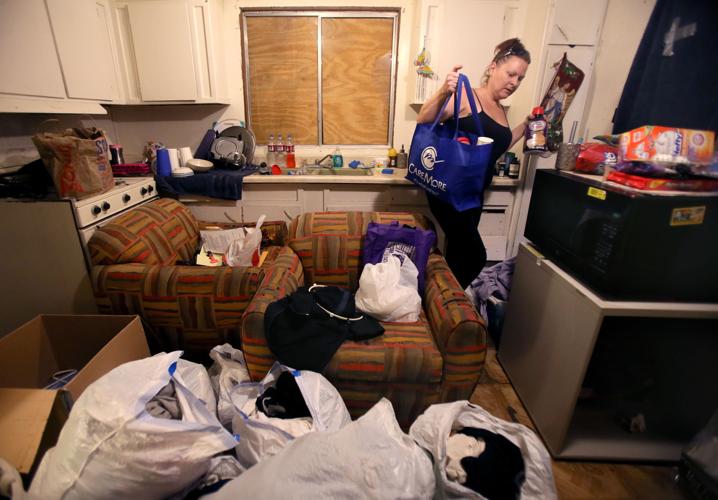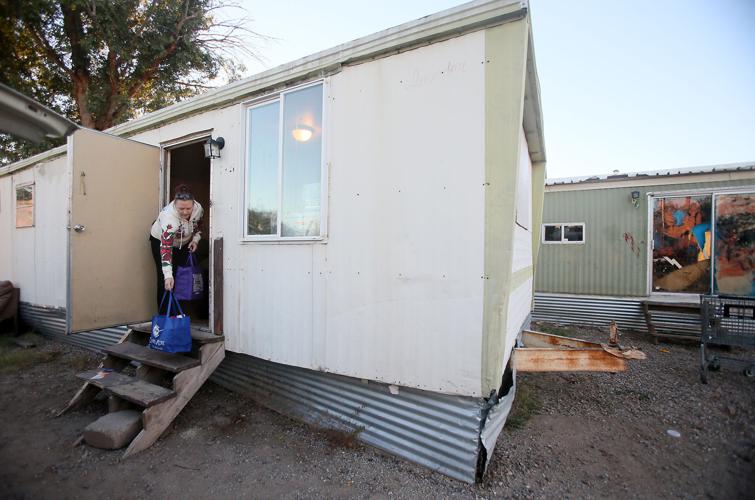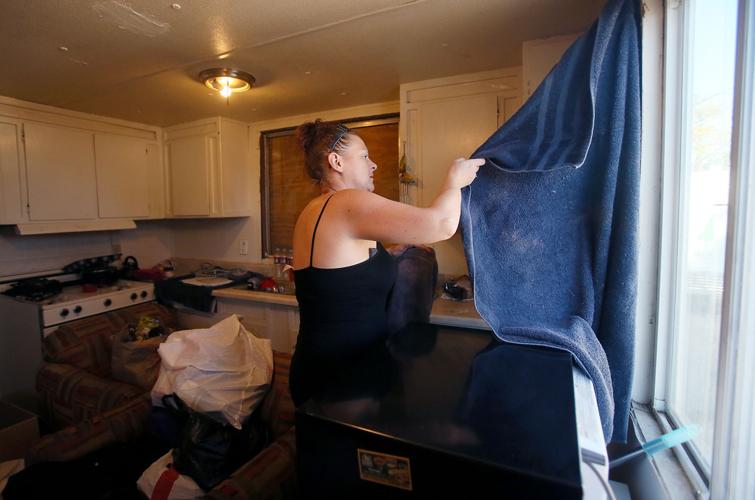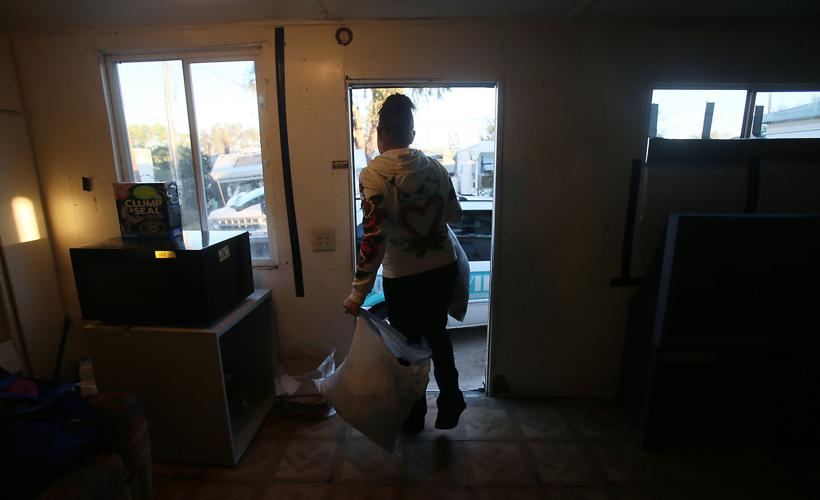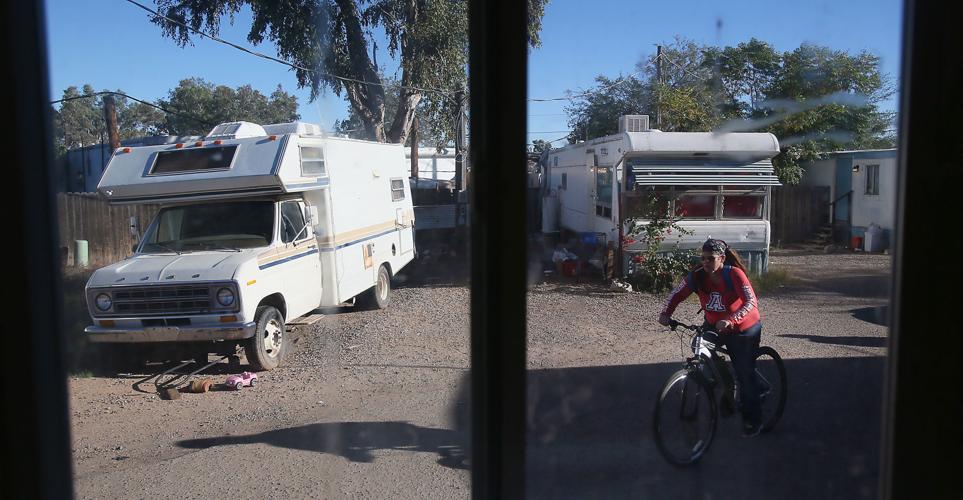Pamela Smith points out her trailer’s broken windows, busted out by thieves, and the edges of the bathtub, separating from the wall. The ground below the trailer is visible through holes in the bathroom floor, the heater doesn’t work and a wobbly set of stairs leading to the trailer door appears ready to collapse, she said.
She didn’t have a written lease in October when she moved in to the mobile home park at 110 E. Prince Road, but she said the park manager promised he would make repairs.
Smith said she was lucky she could afford to move out a few weeks ago, after the trailer was burglarized and the promised repairs never happened. Her neighbors aren’t so fortunate, she said.
“People moving into places like this won’t stand up for themselves,” said Smith, who said she is on disability because of mental illness and lingering problems related to a broken femur. “It’s a quick-fix for putting a roof over your head.”
Substandard housing is too often the standard in Arizona’s mobile home parks, housing advocates say. State and local officials are trying to improve the parks and hold irresponsible landlords accountable, without inadvertently putting more low-income residents in the streets.
“Some cities and towns are getting more restrictive on these parks,” said Val Iverson, executive director of the Arizona Housing Alliance, a nonprofit working to expand access to affordable housing. “But I think we’d rather have someone living in a dumpy trailer than on the street.”
The Arizona Housing Alliance has launched a mobile home “working group” — including advocates, local governments and owners of mobile home parks — focused on improving the state’s aging mobile homes, which comprised about 10 percent of occupied housing in Arizona as of the 2010 Census.
Many of the oldest trailer parks in Arizona are either in disrepair or are being redeveloped into other uses, said Susan Brenton, executive director of Manufactured Housing Communities of Arizona, a lobbying group for mobile home park owners.
That’s unfortunate because the parks are a major source of housing for low-income Arizonans, and modern zoning codes can make it hard to open new parks, she said.
“Cities and counties have to look at the issue of, do we really want these older mobile home parks to go away or not?” she said. “This is affordable housing. If we close down that park, what is going to happen to these people?”
Local housing assistance is stretched thin: Tucson’s Section 8 housing-voucher program, which subsidizes rent for low-income people, has a wait list of more than 18,600 families, said Sally Stang, director of the city’s Housing and Community Development Department.
The mobile home working group’s initial recommendations, compiled in a September report, include:
- Start tracking problematic mobile home park properties, and help fund county assessors’ offices to electronically store data collected through the rental property registration law, which requires landlords to register their rental properties.
- Offer displaced mobile home park residents the same type of housing counseling and financial assistance provided to those who lost homes to foreclosure.
- When a park shuts down, owners should seek out other mobile home parks with vacant spaces where displaced residents could go.
- Increase access to the state “relocation fund,” which provides safety-net funding to poor tenants displaced when a park shuts down. The fund currently only helps people who own their trailer and rent the space below it; it doesn’t apply to those who rent both the trailer and the space.
- Create a consumer guide, in English and Spanish, to help landlords and tenants better understand mobile home law.
- Boost the number of mobile home parks owned cooperatively by park residents.
WEAK CODE ENFORCEMENT
While some municipalities are cracking down on trailer parks, advocates for the poor in Tucson say code enforcement is still too weak here.
Lax or underfunded enforcement allows problems to persist in aging mobile home parks and in other low-cost housing — especially in Pima County. The county has intentionally adopted a limited set of property maintenance codes to avoid the cost of enforcing the code inside occupied residential properties.
That means renters living in unsafe or uninhabitable units can’t just call up a county inspector to force repairs of hazardous conditions inside their homes — they would have to take their landlords to court.
Government should not pass the burden of code enforcement onto low-income, vulnerable tenants who may not have the time or resources to engage in a lengthy court case, said Beverly Parker, attorney for Southern Arizona Legal Aid.
Many can’t afford the expense, are afraid of retaliation or don’t know their rights as tenants, and so they tend to keep quiet, she said.
In 2014, after the Star reported on the lack of code enforcement in the county, Pima County Developmental Services — which oversees code enforcement — wrote a budget proposal to expand the code to cover occupied housing, starting in fiscal year 2016. The cost would have been $269,000, but County Administrator Chuck Huckelberry did not include it in his recommended budget, said Carmine DeBonis, department director.
LOCAL ISSUES
Vulnerable mobile home buyers need more support in ensuring the trailer they’ve purchased or rented is decent and safe, said Marcos Ysmael, program manager for the Pima County Housing Center. The center is part of the Arizona Housing Alliance’s mobile home working group and will help implement the group’s recommendations locally.
“A lot of times these folks are in desperate situations. They don’t have resources and time to do a thorough inspection of the unit, and some problems you’re only going to see when it rains, for example,” he said.
Prince Road Park is owned by Todd Kroepel of Talazera Holding Group LLC, who lives in Southern California and referred questions to the park’s local manager, Don Knitter.
Knitter said he made a mistake in renting the trailer to Smith in such poor condition, but he said Smith was supposed to make the repairs. The previous park owner was negligent, resulting in widespread maintenance issues, said Knitter, who took over the park in August.
Keeping up with maintenance is especially tough when tenants don’t quickly report issues like water damage that only worsen over time, he said.
At the trailer park, “I’m cleaning up a mess left by someone else,” he said. “We’re doing our best to make it livable and safe and compliant.”
UNLICENSED SELLERS
Pima County officials added plans to improve distressed mobile home parks to the county’s long-term plan, called Pima Prospers, following the Star’s reporting on the issue, said Carla Blackwell, deputy director of Pima County Development Services department.
At the top of the agenda: The department is trying to crack down on people who are relocating trailers built before 1976 — before U.S. Department of Housing and Urban Development construction standards were established — without proper paperwork, Blackwell said.
Those older, and potentially dangerous, trailers require permits to move and an inspection to prove they’ve been brought up to livable standards, Blackwell said. The requirement aims to stop landlords from moving decrepit trailers from a defunct park to another location where they can continue to rent or sell them, she said.
Other systemic issues need attention, including the power landlords wield over mobile home tenants who are scared of having an eviction on their record, which can make it nearly impossible to find decent housing, said Parker of Southern Arizona Legal Aid. Stronger protections for tenants in eviction court could help, she said.
During eviction proceedings, held in the justice courts, tenants often show up without a lawyer and their cases are usually decided within minutes.
Some unscrupulous trailer park owners run “rent-to-own” scams, offering tenants the option to pay extra each month toward purchasing their trailer. But before the trailer is paid off, the sellers find a pretext to evict the tenant, in order to re-sell the trailer and make more money on it. Often the trailers they’re selling are only worth a fraction of the price they’re charging, Parker said.
In other cases, tenants pay off the trailer, only to find the seller never actually held title to it because it was abandoned by the previous owner. Among the Arizona Housing Alliance’s recommendations: Make it easier for new buyers to immediately acquire proper title to their trailer, so unscrupulous sellers can’t find a way to take them back, and impose penalties on sellers who deal in mobile homes without titles.
Brenton emphasized that in Arizona, “the vast majority of the parks are well-run”.
“Most of what you’re going to read about in newspapers and hear about on TV are bad issues,” she said. “Everyone has to realize, we are the most affordable type of living that’s unsubsidized.”


